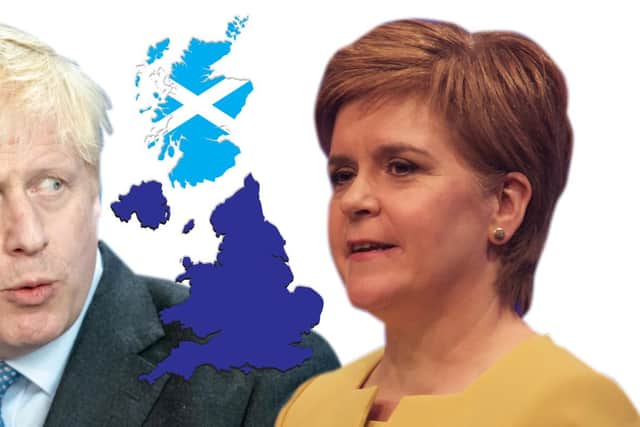Scottish independence poll: do people in Scotland want to be independent - what do the latest 2021 polls say?
and live on Freeview channel 276
Nearly seven years since the 2014 Scottish independence referendum, the question of whether the country should stay a part of the UK is still on the political agenda.
Now there is a larger pro-independence majority at Holyrood following the Scottish Parliament election, the argument over whether there should be a second referendum has intensified.
Advertisement
Hide AdAdvertisement
Hide AdWhile Prime Minister Boris Johnson has said that focus should be on the UK’s recovery from the Covid crisis and not on “indyref2”, SNP leader Nicola Sturgeon has pledged to hold another independence vote in the first half of the next parliamentary term.


However, ultimately it all comes down to the will of the people and whether Scots want to be independent.
We take a look at the latest opinion polls.
How have opinions changed since the 2014 independence referendum?
The first independence referendum resulted in a win for the pro-Union campaign.
Voters were asked the question: “Should Scotland be an independent country?”
Advertisement
Hide AdAdvertisement
Hide AdThe “No” camp won with 2,001,926 votes - 55 per cent - over the “Yes” team’s 1,617,989 - 45 per cent - and the country subsequently remained a part of the UK.
But a lot has changed since the 2014 vote, including Brexit and the arrival of the deadly coronavirus.
Predictably, these major events have impacted public opinion on Scottish independence.
Since the middle of 2020, according to a New Statesman poll tracker, a consistent majority of Scots have backed leaving the UK.
Advertisement
Hide AdAdvertisement
Hide AdThis may have been fuelled by the UK’s exit from the EU, when the majority of Scots voted to Remain, as well as Mr Johnson’s government’s handling of the pandemic.
But more recently there seems to be increased momentum on the No side.
At the end of April 2021, an exclusive poll by Savanta ComRes for The Scotsman found that support for Yes was as its lowest level since just before the general election in 2019.
If a second independence referendum was held tomorrow, 42 per cent of voters would go for Yes while 49 per cent would back no, and 8 per cent would be undecided, according to the poll.
Advertisement
Hide AdAdvertisement
Hide AdAnd when don’t knows are excluded, the poll predicts that a No vote would win indyref2 with a similar margin to the original referendum, with 54 per cent to Yes’s 46 per cent.
A more recent Savanta ComRes poll on the latest voting intentions on the question of independence carried out on 4 May predicted a 42 per cent “Yes” vote and a 50 per cent “No” vote, giving the latter side a lead of eight points again.
Do people in Scotland want to be independent?
However, other surveys conducted in the lead up to the May election show just how easily public opinion on independence can fluctuate.
An Opinium poll carried out the day before the Savanta ComRes one suggests a tie of 45 per cent between the two sides.
Advertisement
Hide AdAdvertisement
Hide AdAnd a Panelbase poll undertaken at the end of April sees a lead of three points for Yes at 48 per cent to 45.
Support for independence is also split by different age groups, with young Scots being overwhelmingly in favour of leaving the Union.
The latest Panelbase survey for The Sunday Time shows those aged 16 to 35 back independence by 62 per cent, compared to 48 per cent for Scottish voters as a whole.
Indeed, the question isn’t just whether Scots want to see an independent country, but if they want it to happen in the next few years as the SNP has promised.
Advertisement
Hide AdAdvertisement
Hide AdA YouGov survey for The Times, carried out between 2 and 4 May, indicates that voters are more concerned with recovery from the pandemic over the next five years, rather than independence.
Respondents were asked to list their top priorities for the new government, and health and the economy came joint top at 55 per cent.
Independence came fifth after education, climate change and the environment, after it was listed as a priority by 21 per cent.
